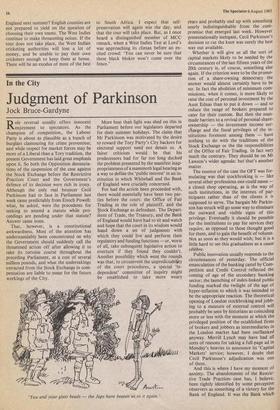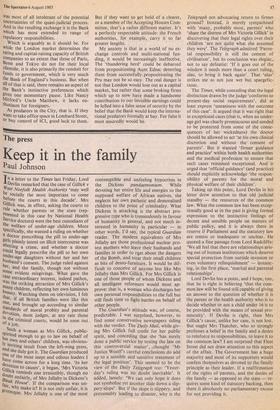In the City
Judgment of Parkinson
Jock Bruce-Gardyne
Role reversal usually offers innocent enjoyment to spectators. As the champion of competition, the Labour Party is about as Plausible as a bunch of burglars clamouring for crime prevention; and while respect for market forces may be more of a Liberal than a Tory tradition, the present Government has laid great emphasis upon it. So both the Opposition denuncia- tions of the suspension of the case against the Stock Exchange before the Restrictive Practices Court and the Government's defence of its decision were rich in irony. Although the only real bouncer Cecil Parkinson had to face in Parliament last week came predictably from Enoch Powell: what, he asked, were the precedents for seeking to amend a statute while pro- ceedings are pending under that statute? Answer came none.
That, however, is a constitutional awkwardness. Most of the attention has understandably been concentrated on why the Government should suddenly call the threatened action off after allowing it to take its tortoise course throughout the preceding Parliament, at a cost of several million pounds, and what the undertakings extracted from the Stock Exchange in com- pensation are liable to mean for the future workings of the City.
More heat than light was shed on this in Parliament before our legislators departed for their summer holidays. The claim that Mr Parkinson was motivated by the desire to reward the Tory Party's City backers for electoral support need not detain us. A fairer criticism would be that his predecessors had for far too long ducked the problem presented by the manifest inap- propriateness of a mammoth legal hearing as a way to define the 'public interest' in an in- stitution in which Whitehall and the Bank of England were crucially concerned.
For had the action been proceeded with, there would essentially have been two par- ties before the court: the Office of Fair Trading in the role of plaintiff, and the Stock Exchange as defendant. The Depart- ment of Trade, the Treasury, and the Bank of England would have had to sit and watch and hope that the court in its wisdom would hand down a set of judgments with which they could live and perform their regulatory and funding functions — or, worst of all, take subsequent legislative action to overturn if they found they couldn't. Another possibility which went the rounds was that, to circumvent the unpredictability of the court 'procedures, a special 'in- dependent' committee of inquiry might be established to take more weary 'You and your glass beads — the Japs have beaten us to it again.'
years and probably end up with something nearly indistinguishable from the com- promise that emerged last week. However presentationally inelegant, Cecil Parkinson's decision to cut the knot was surely the best way out available.
Whether it will give us all the sort of capital markets likely to be needed by the circumstances of the last fifteen years of the 20th century is, of course, something else again. If the criterion were to be the promo- tion of a share-owning democracy the answer would almost certainly have to be no. In fact the abolition of minimum com- missions, when it comes, is more likely to raise the cost of personal investment by the Aunt Ednas than to put it down — and to reduce the range of brokers prepared to cater for their custom. But then the man- made barriers to a revival of personal share- ownership — the investment income sur- charge and the fiscal privileges of the in- stitutions foremost among them — have nothing to do with the traditions of the Stock Exchange or the the responsibilities of the Office of Fair Trading. In fact very much the contrary. They should be on Mr Lawson's wider agenda: but that's another matter.
The essence of the case the OFT was for- mulating was that stockbroking is — like several other professions one could name — a closed shop operating, as is the way of such institutions, in the interests of par- ticipants rather than of the clients it is supposed to serve. The bargain Mr Parkin- son has struck will go some way to eliminate the outward and visible signs of this privilege. Eventually it should be possible for the institutions to pay for services they require, as opposed to those thought good for them, and to gain the benefit of volume. Not as soon as they would wish; but it is a little hard to see this gradualness as a cause célebre.
Public innovation usually responds to the circumstances of yesterday. The official emasculation of the banking cartel by Com- petition and Credit Control reflected the coming of age of the secondary banking sector; the launching of index-linked public funding marked the twilight of the age of hyper-inflation to which it was intended to be the appropriate reaction. The theoretical opening of London stockbroking and jobb- ing to a measure of external control will probably be seen by historians as coinciding more or less with the moment at which the privileged position of the established firms of brokers and jobbers as intermediaries in the London market had been outflanked anyway. Merrill Lynch may have had all sorts of reasons for taking a full-page ad in Monday's heavies to announce its 'Capital Markets' service; however, I doubt that Cecil Parkinson's adjudication was one of them.
And this is where I have my moment of anxiety. The abandonment of the Restric- tive Trade Practices case has, I believe, been rightly identified by some perceptive observers as something of a victory for the Bank of England. It was the Bank which was most of all intolerant of the potential uncertainties of the quasi-judicial process. And in the resulting exchange it is the Bank which has most extended its range of regulatory responsibilities.
Which is arguably as it should be. For while the London market determines the rating and capital-raising capacity of British Companies to an extent that those of Paris, Bonn and Tokyo do not for their local clientele, it is also primarily the conduit for funds to government, which is very much the Bank of England's business. But when all of that is said, there remains an aspect of the Bank's instinctive preferences which gives one momentary pause. Like Nancy Mitford's Uncle Matthew, it lacks en- thusiasm for foreigners.
As predators in the City, that is. If they want to take office space in Lombard Street, or buy control of ICI, good luck to them. But if they want to get hold of a clearer, or a member of the Accepting Houses Com- mittee, that's a rather different matter. It's a perfectly respectable attitude: the French authorities, for example, carry it to far greater lengths.
My anxiety is that in a world of no ex- change controls and multi-national fun- ding, it would be increasingly ineffective. The 'thundering herd' could be debarred from propositioning Aunt Edna: deterring them from successfully propositioning the Pru may not be so easy. The real danger is not that London would lose out as a capital market, but rather that some broking firms which up to now have made a handsome contribution to our invisible earnings could be lulled into a false sense of security by the belief that the Bank would keep the interna- tional predators formally at bay. For false it most assuredly would be.







































 Previous page
Previous page